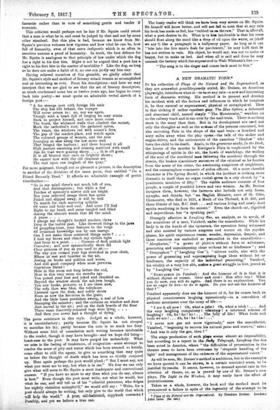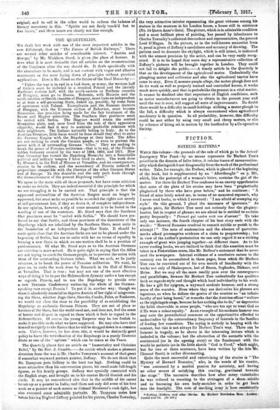A NEW DRAMATIC FORM.*
IN his collection of Plays of the Natural and the Supernaturet, as they are somewhat grandiloquently styled, Mr. Dreiser, an American
playwright, introduces what is--to us at any rate—a new and interesting form of dramatic writing. His method is to present and develop his incident with all the factors and influences in which he imagines
it, be they natural or supernatural, physical or metaphysical. Thus in that striking if rather repellent play. The Blue Sphere, a deformed
and abnormal child, named simply "The Monstrosity," wanders on to the railway track and is run over by the mail train. There is nothing more in the story than that. But in its development are used not only the thoughts as well as the actiess of the persons concerned, bnt also oncoming Fate in the shape of the mail train—a hundred and sixty miles away when the play opens—the talk of the stoker and
engine-driver, and the enticements of the nameless " Shadow " who lures the child to its death. Again, in the gruesome study, In the Dark,
the horror of the murder in Kerrigan's Flats is emphasized by the whisperings of spirits in the air, the howls of watchdogs. the wailing of tho soul of the murdered man following the murderer through the streets, the broken ejaculatory sentences of the criminal as he hurries
from the scene of his crime, the awakening suspicions of neighbours, and the commonplace comments of police officers. Of a more cheerful character is The Spring Recital, in which the incident is nothing more dramatic in itself than an organ recital given in a city church by " a pessimistic musician of fifty." The visible audience consists of four
people, a couple of youthful lovers and two women. As Mr. Dreiser imagines them, however, the listeners also include not only fauns, nymphs, and dryads, but " an Haglish Minister, once of St. Giles, Cirencester, who died in 1031, a Monk of the Thebaid, A.D. 300, and three Priests of Isis, B.C. 2840 . . . and various living and newly dead spirits wandering in from the streets." Even the church cat, dignified and supercilious, has "a speaking part."
Strangely effective is L'itighing ass, an analysis, so to speak, of the sensations of a man, Vataheel, under the anaesthetio. While his
body is in the hands of the operators, the operation being witnessol and also assisted by various surgeries and nurses on the psychic planes, his spirit experiences tearer, wonder, depression, despair, and these emotions are embodied er personified in the anaesthetics- " Aleephora.n," " a power of pitynee without form or substance, generating and superimposing ideas without let or hindrance " and " Demyaphon " (" Laughing Gas "), " nitrous oxide, also with th3 power of generating and superinaposing huge ideas without let or hindrance, the capacity of the individual permitting." Vatabeel, his vitality at a very low ebb, mates a great struggle to live, jeered at by " Laughing Gaa " :-
" DESIY.tPHON (to Vatabee): And the humour of it is that it is without rhyme or reason. Over and over 1 Eon after eon ! What you do now, you will do again. And there is no explanation. You are so eager to live—to do it again. Do you not see the humour of that ? "
Vatabeel apparently does see the humour of it, for he comes back to physical consciousness laughing uproariously—in a convulsion of sardonic merriment over the irony of life :- " I see it all now I Oh, what, a joke t Oh, what a trick ! ... And the very laughing compulsory 1 vibratorr ! a universal scheme of
laughing Oh, ho ! ho I ho ! ... The folly of life 1 What fools and tools we aro ! Ah, ha ! ha ! ha! ..."
" I never saw gas act more vigorously," says the anaesthetist. Vatabeel, " beginning to recover his natural poise and reserve," asks: " And waa it only the gas, then ? "
The stage produotion of finch playa seems almost an impossihility, but according to a report in the Dag Telegraph, Laughing Gas has been acted in America, where " the difficulties of presentation in the theatre seem to have been °Tercels° by ' eloquent handling of the light' and management of the cadences of the supernatural voices."
As will be seen, Mr. Dreiser's method is ambitious, but in the examples we have quoted it can be shown, in a certain restrioted sense, to be
justified byresulta. It seems, however, to demand special care in the selection of theme, or, as is proved by one of Mr. Dreiser's own plays, The Light in the Window, it may easily have the effect of
pretentiousness.
Taken as a whole, however, the book and the method must be pronounced a failure in spite of the ingenuity of the attempt to be *nays of the 2falurol and the Swperraenral. Dy Theodore Drelser. London: John Lane. [Os. rat.]
eating, and to call in the other world to redress the balance of literary monotony in this. " Spirits are not finely touch'd but to fine issues," and these issues are clearly not fine enough.







































 Previous page
Previous page